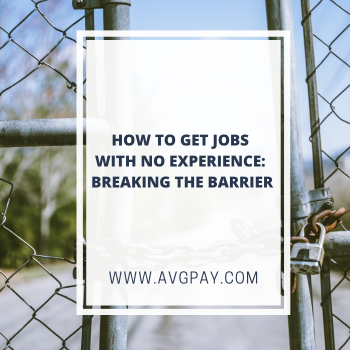You’ve just graduated and are looking to kickstart your career. You start browsing the internet looking for job opportunities. Yet any job that looks somewhat decent requires YEARS of experience. Heck, there are even graduate jobs that require five years of experience.
This is a situation that many find themselves in. Some people don’t have the time to gain experience before getting the job they really want.
So what can you do?
Well, first, you will need to manage expectations. Unfortunately, it’s not as simple as being considered for your dream job straight away. Not unless you have something really unique or special to put forward.
But there are definitely things you can do. Whether it’s tailoring your resume, using connections, or just getting your foot in the door somehow.
In this article, we’ll provide a complete walkthrough on how to get a job with no experience.
Use Academic Experience
So, you’re entering the job market with what seems like no work experience. But here’s the deal: While you may not have experience, you do have years of building skills and achievements in education that are easily applicable to the world of employment.
So don’t underestimate your years in school and college. If you look back through the years, you should be able to find skills and accomplishments that can significantly enhance your employability.
Need help to think of specific examples?
Consider the following:
Projects and Assignments
Remember those projects, research papers, and assignments that used to keep you up at night? Well, they were more than just another grade. They’re proof of your ability to apply theoretical principles to real-world scenarios. Highlight how these projects required problem-solving and analytical thinking, indicating your capacity to tackle challenges head-on.
Additionally, identify the specific courses that directly align with the job you’re applying for. For example, if you’re looking for a marketing role, emphasize courses related to marketing strategies, consumer behavior, or digital marketing. Highlighting these demonstrates your strong theoretical foundation, showcasing your understanding of key concepts.
Soft skills identification
Balancing the demands of coursework, assignments, and possibly part-time jobs is no small feat. This experience provides valuable soft skills such as time management, organization, and attention to detail. Mention how you effectively managed your academic commitments and responsibilities, emphasizing your capability to handle multiple tasks simultaneously.
Tailor your resume for each job posting.

Every job you see will require you to submit a resume. Unfortunately, a generic one-for-all resume will not cut it. You’re more likely to secure an interview if you can help a hiring manager see your dedication to the role through your resume.
Research the company and role.

Before you start pouring words onto your resume, research the company and the specific role you’re applying for.
- What’s their company culture like?
- What are they looking for?
- What skills are essential?
The more you know, the better you can tailor your resume to match their expectations.
Highlight your transferable skills:

So you might not have worked in a similar position before, but think about the skills you’ve picked up from other areas of your life – be it volunteering, school projects, or even hobbies.
- Are you a stellar problem solver? That’s problem-solving skills.
- A persuasive communicator? That’s communication skills
- A master organizer? That’s organization skills.
These are all skills that can be translated into a professional setting.
More importantly, if you don’t include the skills the company is looking for, your application may not make it through the initial screening stage. We have created an article that includes the specific keywords that most application tracking systems look for.
Write a powerful summary.
Your resume’s summary or objective section is your opportunity to make a killer first impression.
Write a concise statement highlighting your passion for the industry, your eagerness to learn, and the unique strengths you bring.
Remember, it’s not just about what you’ve done in the past but also about what you’re capable of achieving.
Customize each application
One size doesn’t fit all when it comes to resumes. Hiring managers will be able to see straight through an application that is too generic. So, tweak your resume for each application based on the job description and company values. Additionally, highlight the skills and experiences that align most closely with what they’re seeking.
Focus on a growth mindset.
Lastly, embrace your growth mindset. Employers value candidates who are hungry for knowledge and development. So, express your eagerness to learn and how you are determined to succeed within your chosen career path.
You’ll also be able to express your desire for the job within your cover letter. So don’t be afraid to mention that this would be your first job within the industry. Honesty can sometimes go far.
Take courses and get qualifications.

Once you’ve read a few job descriptions, you may realize that you need certain qualifications. It is worth making the investment to get past the qualification hurdle within job opportunities.
Start with entry-level jobs.
Getting your dream job right out of the gate may not be possible. However, an entry level job can help you get your foot in the door within your chosen industry. An entry level position will help you get the relevant experience for future jobs. Potential employers for these jobs are likely to understand that you have limited experience.
However, you may not always secure the first entry level job you apply for. They are likely to be far more competitive as many other job seekers will be in the same position as you. If nothing else, you’ll gain valuable interviewing skills to help you in the future.
Get experience
Yes, we know the whole purpose of this article is to show you how to get a job without experience. But hear us out. Volunteer work or even interning can help you to get experience while building a network. Sometimes, you may even be offered a job if you manage to prove yourself while getting experience.
Build a network
You can choose to build a network in person or online. Either way, having a network can provide a massive boost when you’re looking for your first job. You can lean on those connections to find opportunities and sometimes even be able to skip the application stage straight through to interviewing.
Bottom Line
And there you have it—a comprehensive guide to getting a job without experience. We’ve covered the essential steps, from finding the skills to replace experience to applying.
Feel free to check out the rest of our site for more content on the world of employment.
FAQ
Now, to answer some commonly asked questions.
How can I get a job fast with no experience?
To secure a job quickly without experience, start by focusing on entry-level positions, internships, or volunteer opportunities. Don’t forget to keep submitting applications, as it is a numbers game. When applying, highlight transferable skills like communication, teamwork, and problem-solving in your resume and cover letter.
How to get a job with no experience at 20?
At 20, you have your whole life ahead of you, so don’t worry. Start by considering internships, apprenticeships, or part-time positions in your desired field. Additionally, keep an eye out for entry level positions. During interviews, showcase your enthusiasm to learn and grow.
What do you say when you have no experience for a job?
When you lack job-specific experience, focus on what you bring to the table. Whether it’s transferable skills, such as adaptability, communication, and willingness to learn, or your work ethic. Lean on experiences you’ve had in life and education to show these skills. Don’t forget to express your strong work ethic and desire to succeed in the role.
Why is it so hard to find a job?
Job hunting can be challenging due to factors such as high competition, economic conditions, and industry changes. Lacking specific skills and experience can make it even more difficult. This is when you need to think outside the box to get yourself to where you need to be.
What do you say when applying for a job with no experience?
When applying for a job without experience, focus on emphasizing your enthusiasm for the role and your willingness to learn. Additionally, state that you have a strong work ethic passion for the industry, and you are determined to succeed.
Is it OK to apply for a job without experience?
Yes, it’s absolutely okay to apply for a job without experience, especially if the job is advertised as an entry-level position. Many employers understand that candidates may not have direct experience and are often looking for potential, enthusiasm, and a good cultural fit. Tailor your application to highlight your strengths and eagerness to learn.
How hard is it to get a job with no experience?
Getting a job with no experience can be challenging, but it’s not impossible. Entry-level positions are designed for candidates without prior experience. But if you’re applying for roles that are senior positions or require years of experience, then you will definitely struggle.

